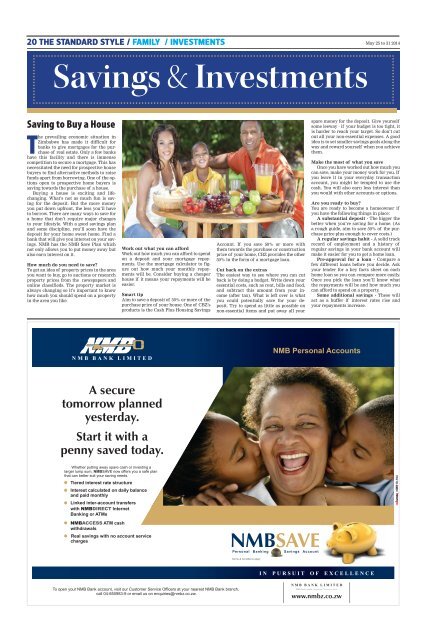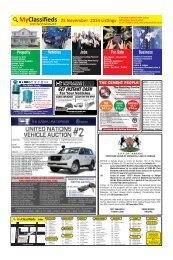Standard Style 25 May 2014 - 31 May 2014
You also want an ePaper? Increase the reach of your titles
YUMPU automatically turns print PDFs into web optimized ePapers that Google loves.
20 THE STANDARD STYLE / FAMILY / INVESTMENTS<br />
<strong>May</strong> <strong>25</strong> to <strong>31</strong> <strong>2014</strong><br />
Savings & Investments<br />
Saving to Buy a House<br />
The prevailing economic situation in<br />
Zimbabwe has made it difficult for<br />
banks to give mortgages for the purchase<br />
of real estate. Only a few banks<br />
have this facility and there is immense<br />
competition to secure a mortgage. This has<br />
necessitated the need for prospective house<br />
buyers to find alternative methods to raise<br />
funds apart from borrowing. One of the options<br />
open to prospective home buyers is<br />
saving towards the purchase of a house.<br />
Buying a house is exciting and lifechanging.<br />
What’s not as much fun is saving<br />
for the deposit. But the more money<br />
you put down upfront, the less you’ll have<br />
to borrow. There are many ways to save for<br />
a home that don’t require major changes<br />
to your lifestyle. With a good savings plan<br />
and some discipline, you’ll soon have the<br />
deposit for your home sweet home. Find a<br />
bank that will give you interest on your savings.<br />
NMB has the NMB Save Plan which<br />
not only allows you to put money away but<br />
also earn interest on it.<br />
How much do you need to save?<br />
To get an idea of property prices in the area<br />
you want to buy, go to auctions or research<br />
property prices from the newspapers and<br />
online classifieds. The property market is<br />
always changing so it’s important to know<br />
how much you should spend on a property<br />
in the area you like.<br />
Work out what you can afford<br />
Work out how much you can afford to spend<br />
on a deposit and your mortgage repayments.<br />
Use the mortgage calculator to figure<br />
out how much your monthly repayments<br />
will be. Consider buying a cheaper<br />
house if it means your repayments will be<br />
easier.<br />
Smart tip<br />
Aim to save a deposit of 50% or more of the<br />
purchase price of your house. One of CBZ’s<br />
products is the Cash Plus Housing Savings<br />
Account. If you save 50% or more with<br />
them towards the purchase or construction<br />
price of your home, CBZ provides the other<br />
50% in the form of a mortgage loan.<br />
Cut back on the extras<br />
The easiest way to see where you can cut<br />
back is by doing a budget. Write down your<br />
essential costs, such as rent, bills and food,<br />
and subtract this amount from your income<br />
(after tax). What is left over is what<br />
you could potentially save for your deposit.<br />
Try to spend as little as possible on<br />
non-essential items and put away all your<br />
spare money for the deposit. Give yourself<br />
some leeway - if your budget is too tight, it<br />
is harder to reach your target. So don’t cut<br />
out all your non-essential expenses. A good<br />
idea is to set smaller savings goals along the<br />
way and reward yourself when you achieve<br />
them.<br />
Make the most of what you save<br />
Once you have worked out how much you<br />
can save, make your money work for you. If<br />
you leave it in your everyday transaction<br />
account, you might be tempted to use the<br />
cash. You will also earn less interest than<br />
you would with other accounts or options.<br />
Are you ready to buy?<br />
You are ready to become a homeowner if<br />
you have the following things in place:<br />
A substantial deposit - The bigger the<br />
better when you’re saving for a home. (As<br />
a rough guide, aim to save 50% of the purchase<br />
price plus enough to cover costs.)<br />
A regular savings habit - A solid track<br />
record of employment and a history of<br />
regular savings in your bank account will<br />
make it easier for you to get a home loan.<br />
Pre-approval for a loan - Compare a<br />
few different loans before you decide. Ask<br />
your lender for a key facts sheet on each<br />
home loan so you can compare more easily.<br />
Once you pick the loan you’ll know what<br />
the repayments will be and how much you<br />
can afford to spend on a property.<br />
Some additional savings - These will<br />
act as a buffer if interest rates rise and<br />
your repayments increase.


















